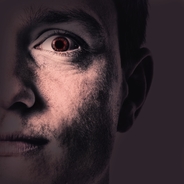Mental illnesses are like broken bones: unless you've ever experienced one yourself, you don't really know what they feel like.
Those who haven't ever busted their tibia or fractured their ribs know enough about what the process entails, sure - but they don't know the complexities of the situation. They don't know how much it hurt, or what helps someone to cope with the symptoms, or how long it takes to heal.
And sometimes, of course, bones don't ever heal properly. Broken fingers grow out like bent tree branches; complex breaks leave visible scars - the body still functions, but not quite how it should. Mental illnesses are a similar sort of deal. Some can be managed, others can't.
The trouble is, we know a lot more about how to interact with people who have broken bones than we do with individuals who suffer with anxiety or schizophrenia or a personality disorder. If your friend breaks their ankle, you might ask them how they did it, sign their cast with something witty, and wish them a speedy recovery.
But when someone has a mental illness, what are you supposed to do? What do you say?

Ultimately, every person's experience with mental illness is different, so there's no cookie cutter phrase you can say or action you can do that will make them feel better. But there is one thing you should never say: "It's all in your head."
This is a pretty dumb thing to say for two reasons; firstly: of course it's in a person's head! That's where their brain is. It would hardly be a mental illness if it was occurring in their pancreas, now, would it? You wouldn't point at someone with asthma and say, "Buck up, buddy, it's all in your lungs," so why say it to someone whose health condition is in their brain?
Secondly, and more importantly: saying this will likely only cause harm.
People with mental health conditions have just as much control over their illnesses as people with physical conditions such as diabetes or eczema. They can be treated with medications (to a somewhat successful degree) and handled with therapy, but nothing is going to stop that person having bipolar disorder or chronic depression.
By saying that something is all in someone's head, you will invalidate their experiences. People with depressive disorders already experience feelings of guilt and self-loathing due to their illness, so telling them their condition isn't real is only going to worsen these sensations.
What's more, any kind of stigmatisation of mental health conditions impacts how we see them in society. If we perpetuate the narrative that mental illnesses are all in people's heads, those that suffer with them will be reluctant to seek treatment. And, even worse, the correct treatment might not be available, as health services will not allocate enough resources to people with medical problems that they think are just "in their heads".
Fortunately, there are things you can do.
If you know that someone close to you is experiencing difficulties with their mental health, make sure you are there for them. This might mean physically (i.e. spend time with them, try not to leave them alone for too long, ensure they're eating properly, prevent them from doing anything that may harm themselves or others) or emotionally (i.e. send them a text letting them know you're thinking of them, call them to ask how their day went, keep in touch with other friends or family members to create a support network).
In severe cases, encourage someone with a mental illness to seek medical treatment, or consult a health professional on their behalf in order to pursue the best course of treatment.
Mental illnesses are real and they are life-changing. Today, on World Mental Health Day, we should all try to be aware of that, and to take a little more care when speaking about mental health conditions. Only then can we make more progress in the treatment of such problems.

